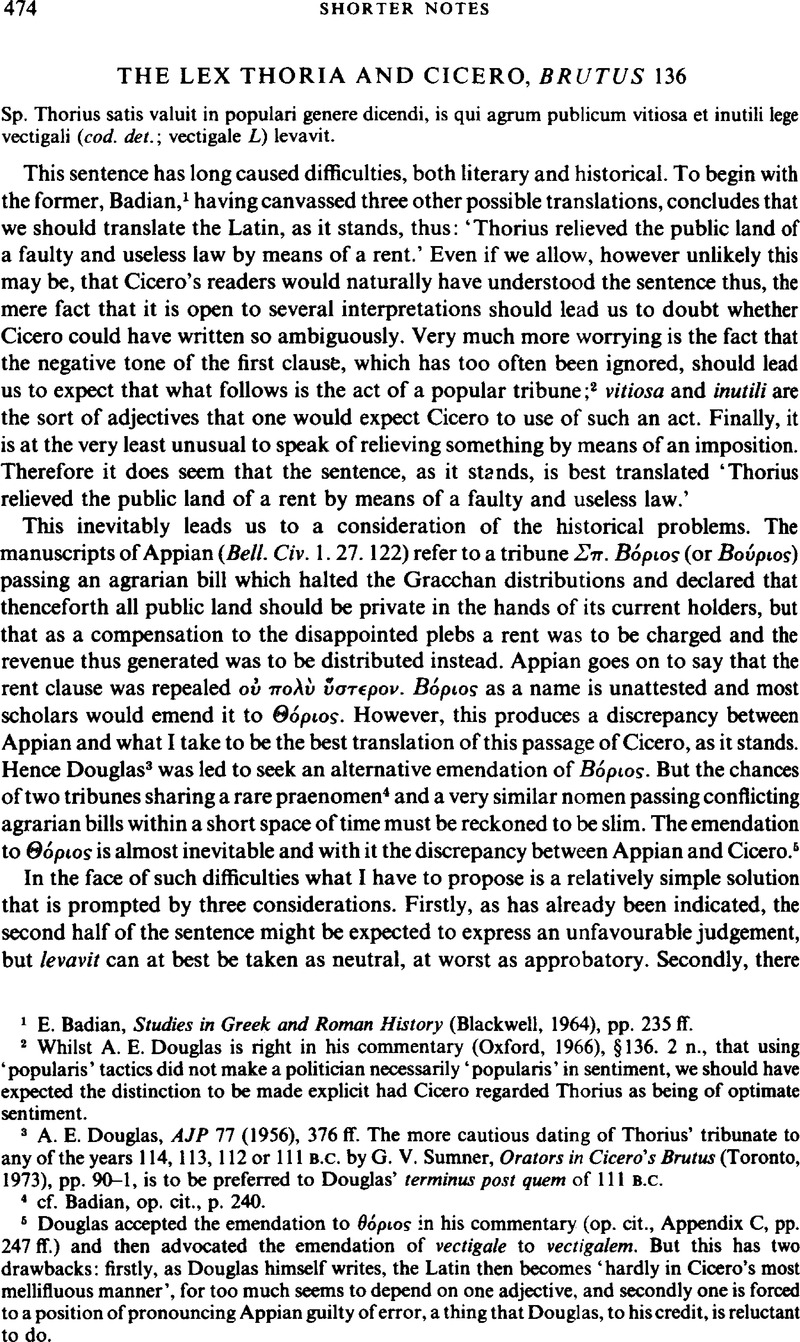No CrossRef data available.
Published online by Cambridge University Press: 11 February 2009

1 Badian, E., Studies in Greek and Roman History (Blackwell, 1964), pp. 235 ff.Google Scholar
2 Whilst, A. E. Douglas is right in his commentary (Oxford, 1966), §136. 2 n.Google Scholar, that using ‘popularis’ tactics did not make a politician necessarily ‘popularis’ in sentiment, we should have expected the distinction to be made explicit had Cicero regarded Thorius as being of optimate sentiment.
3 Douglas, A. E., AJP 77 (1956), 376Google Scholar ff. The more cautious dating of Thorius' tribunate to any of the years 114, 113, 112 or 111 B.C. by Sumner, G. V., Orators in Cicero's Brutus (Toronto, 1973), pp. 90–1, is to be preferred to Douglas' terminus post quem of 111 B.C.Google Scholar
4 cf. Badian, op. cit., p. 240.
5 Douglas accepted the emendation to θóριoς in his commentary (op. cit., Appendix C, pp. 247 ff.) and then advocated the emendation of vectigale to vectigalem. But this has two drawbacks: firstly, as Douglas himself writes, the Latin then becomes ‘hardly in Cicero's most mellifluous manner’, for too much seems to depend on one adjective, and secondly one is forced to a position of pronouncing Appian guilty of error, a thing that Douglas, to his credit, is reluctant to do.
6 The nearest example I can find in Cicero of an impersonal object with an impersonal ablative is at Flacc. 33: sumptu … civitates leveret, but in this instance it is easy to see how the object could be regarded as personal since it is the people of those states who are being relieved of the expense.
7 This point is, unfortunately, not as strong as it might appear in view of Cicero, ad Att. 1. 19. 4, liberabam agrum. Whilst liberare and levare are not exact synonyms, nevertheless it is far from certain that Cicero could not have written agrum publicum … vectigali levavit had he so wished.
8 R. Seager has criticised conventional solutions in lines similar to those adopted here (CR n.s. 17 (1967), 12). But his own proposal vexavit produces an unhappy run of long syllables and an unsatisfactory clausula; one also feels doubts about two instrumental ablatives in the same clause. It is, none the less, comforting to find oneself in agreement with that scholar on so many points.
9 I am deeply indebted to Professor R. G. M. Nisbet, who has done much work on my behalf and greatly helped me with his suggestions, and to Mr P. S. Derow of Wadham College, without whose initial encouragement and subsequent guidance this note would never have been written. Neither, of course, is in any way responsible for such mistakes, whether of omission or commission, as remain.